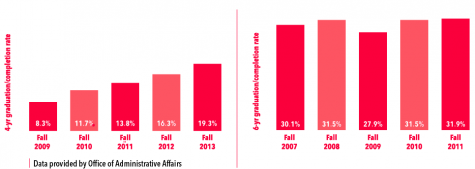Problems with mandatory courses
How students can overcome the struggles of math and other general education courses

Creative Commons license
September 19, 2018
Nearly one in three students end up dropping out of college completely, according to a report published by the National Student Clearinghouse (NSC) in 2017.
The overall completion rate for students attending college in the United States is 57 percent, according to the NSC. It also found that the typical completion rate at four-year public colleges — like IU Southeast — is 35 percent.
At IU Southeast, the overall completion rate sits around 32 percent, according to the most recent data provided by Ronald Severtis, director of the Office of Institutional Effectiveness.
Not all students have trouble in college, and not all students who have trouble face identical issues, but every degree program has something in common: general education requirements.
General education (gen-ed) courses are the core classes required for a degree program, often not related to a student’s chosen major. Gen-ed requirements for all IU Southeast baccalaureate degrees include ethics, diversity and quantitative reasoning — also known as math — to name a few.
Math is Historically Challenging
It is the third gen-ed requirement — quantitative reasoning — that is known to give students significant trouble. Ryan Norwood, the director of student success, says that barriers to success are complex and identifying them is difficult.
However, he says math is historically challenging.
“Students tend to struggle in math overall,” Norwood said. “That’s not just here. It’s nationally if you look at the numbers.”

Kacey Walker, general studies freshman, is one of those students.
Walker is currently enrolled in an online finite math course, and she went in knowing college-level algebra would be a challenge.
“I did test into the highest college algebra class but thought I needed refreshing,” Walker said.
Many math courses — including Walker’s —
utilize ALEKS, an online education environment featuring mathematics, chemistry, statistics and business. Walker says
ALEKS helps her
significantly in
her coursework.
“So far, ALEKS has been
super helpful,” Walker said. “I’ve struggled with math in the past and still do somewhat, but ALEKS makes the concepts easy to understand.”
Conquering the Challenges
What can students do when they struggle with their gen-ed classes, or any classes in general? Angela Salas, associate vice chancellor for academic affairs, says the first step is not being afraid to admit they’re struggling.
Salas mentioned that students have told her they don’t want to bother their instructors or keep them from their work by asking
simple questions.
“Speaking with the faculty member teaching a course is almost always a good first step, whether a student is failing a class or is simply not thriving in it,” she said.
“Students are our work, and as long as a student is showing up for class, is prepared for class, is turning in their work and is generally being a good citizen of the class, faculty members will be absolutely pleased to help them clear up areas of confusion,” Salas said.
Salas added that instructors and faculty want to help people who earnestly want to help themselves. “It’s not really necessary that struggling students struggle in silence.”
Resources for Student Success
No matter the subject matter with which a student is struggling, IU Southeast offers plenty of supplemental resources to help them succeed academically. The Writing Center, the Math Lab, and the Language Lab — just to name a few — are available to all students.
The Student Success Center offers a peer tutoring program that students can utilize for assistance in their 100-200-level courses.
Academic struggles may not stem from difficulty with the coursework, however. If personal matters are the cause of difficulty, IUS has resources to help with those as well.
“It can be hard to concentrate on your studies if your financial world, or your personal world, seems to be falling apart,” Salas said.
However, the greatest resource IU Southeast offers students, according to Ryan Norwood, is its faculty. Norwood echoed the sentiment of Salas, in that students shouldn’t be ashamed to admit they’re struggling and should regularly seek help from IUS faculty.
“To truly learn something, you have to struggle with it a bit,” Norwood said. “That’s just the normal process
of learning.”

